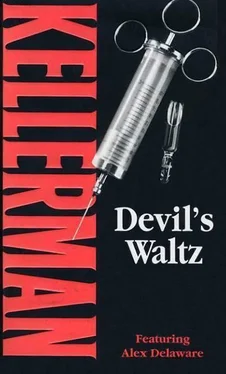She thought for a moment, smiled, and pulled something else out from under the counter. El Producto cigar box. Inside were stacks of SPI requisition forms held together with spring clasps. Five stacks. She spread them on the counter. The top slips all bore the signature of pathologists. I read the patients’ names, saw no evidence of alphabetization or any other system of classification.
She smiled again, said “Please,” and returned to her newspaper.
I removed the clasp from the first pile and sifted through the forms. It soon became obvious that a system did exist. The slips had been classified by date of request , each stack representing a month, each piece of paper placed in daily chronological order. Five stacks because this was May.
No shortcuts — every slip had to be examined. And if Chad Jones’s chart had been checked out before January 1, the form wouldn’t be here at all.
I began reading the names of dead children. Pretending they were just random assemblages of letters.
A moment later I found what I was looking for, in the February stack. A slip dated February 14 and signed by someone with very poor penmanship. I studied the cramped scrawl, finally deciphered the last name as Herbert. D. Kent Herbert, or maybe it was Dr . Kent Herbert.
Other than the signature, the date, and a hospital phone extension, the slip was blank; POSITION/TITLE, DEPARTMENT, REASON FOR REQUEST hadn’t been filled out. I copied the extension and thanked the woman behind the counter.
“Everything okay?” she said.
“Do you have any idea who this is?”
She came over and peered at the form.
“Habert... no. I just work here one month.” Another smile. “Good hospital,” she said cheerfully.
I began to wonder if she had any idea what she was filing.
“Do you have a hospital directory?”
She looked confused.
“A hospital phone book — the little orange ones?”
“Ah.” She bent and produced one from under the counter.
No Herberts in the medical roster. In the following section, listing nonmedical staff, I found a Ronald Herbert, tagged as Assistant Food Services Manager. But the extension didn’t match the one on the slip and I couldn’t see a catering specialist having an interest in sudden infant death.
I thanked her and left. Just before the door closed, I heard her say, “Come again, Doctor.”
I retraced my steps through the sub-basement, passing Laurence Ashmore’s office again. The door was still closed and when I stopped to listen, I thought I heard movement on the other side.
I kept going, looking for a phone, finally spotted a pay unit just past the elevators. Before I got to it the elevator door opened and Presley Huenengarth stood there, looking at me. He hesitated, then walked out of the lift. Standing with his back to me, he removed a pack of Winstons from his suit pocket and took a long time cracking the seal.
The elevator door started to shut. I checked it with the heel of my hand and got on. The last thing I saw before it closed was the security man’s placid stare behind a rising cloud of smoke.
After riding up to the first floor I used an in-house phone near Radiation Therapy to dial D. Kent Herbert’s extension. The hospital’s main switchboard answered.
“Western Pediatrics.”
“I was dialing extension two-five-oh-six.”
“One moment and I’ll connect you, sir.” A series of clicks and mechanical burps, then: “Sorry, sir, that extension’s been disconnected.”
“Since when?”
“I don’t know, sir.”
“Any idea whose extension it was?”
“No, sir. Who were you trying to reach?”
“D. Kent Herbert.”
“Is that a doctor?”
“I don’t know.”
Pause. “One moment... The only Herbert I have listed is Ronald, in Food Services. Would you like me to connect you?”
“Why not?”
Five rings.
“Ron Herbert.” Crisp voice.
“Mr. Herbert, this is Medical Records, calling about the chart you requisitioned?”
“Come again?”
“The medical chart you checked out in February? From SPI?”
“You must have the wrong guy, pal. This is the cafeteria.”
“You never requested an SPI chart on February 14 of this year?”
Laughter. “Now why the heck would I do that?”
“Thank you, sir.”
“No prob. Hope you find what you’re after.”
I hung up, took the stairs to the ground floor and entered the throng in the lobby. Easing my way through hard-packed bodies, I made it to the Information counter and, after spotting a hospital directory near the clerk’s hand, slid it toward me.
The clerk, a dyed-blond black woman, was answering a Spanish-speaking man’s question in English. Both of them looked tired and the acid of strife embittered the air. The clerk noticed the book in my hand and looked down her nose at me. The man’s gaze followed. The queue behind him swayed and rumbled like a giant serpent.
“You can’t have that,” said the clerk.
I smiled, pointed at my badge, and said, “Just want to borrow it for a minute.”
The clerk rolled her eyes and said, “Just for a minute, that’s all.”
I moved to the far end of the counter and flipped the book open to the first page, running my eyes and my index finger down the numbers column on the right side of each page, prepared to scan hundreds of extensions until I found 2506. But I hit the jackpot after only a couple of dozen.
ASHMORE, L.W. (TOX.) 2506
I replaced the book and thanked the clerk. She glared again, snatched it, and placed it out of reach.
“Half a minute,” I said. “Do I get a refund?”
Then I saw the faces of the people waiting in line and regretted being a wise-ass.
I went up to see Cassie, but there was a DO NOT DISTURB sign on her door and the nurse on duty told me both she and Cindy were sleeping.
On my way out of the hospital, my thoughts were intruded upon by someone calling my name. Looking up, I saw a tall, mustachioed man approaching from the main entrance. Late thirties, white coat, rimless glasses, Ivy League clothes. The mustache was an extravagant waxed black handlebar. The rest of him seemed arranged around it.
He waved.
I reached into the past and drew out a name.
Dan Kornblatt. Cardiologist. Former UC San Francisco chief resident. His first year at the hospital had been my last. Our relationship had been limited to case conferences and casual chats about the Bay Area — I’d done a fellowship at Langley Porter and Kornblatt delighted in pushing the proposition that no civilization existed south of Carmel. I remembered him as long on brains and short on tact with peers and parents, but tender with his young patients. Four other doctors were walking with him, two women, two men, all young. The five of them moved rapidly, accompanied by swinging arms — physical fitness or a strong sense of purpose. As they got closer I saw that Kornblatt’s hair had grayed at the temples and his hawk face had taken on a few seams.
“Alex Delaware. My, my.”
“Hi, Dan.”
“To what do we owe the honor?”
“Here on a consult.”
“Really? Gone private?”
“A few years ago.”
“Where?”
“The West Side.”
“But of course. Been back up to the real city lately?”
“Not lately.”
“Me neither. Not since two Christmases ago. Miss that Tadich Grill, all that real-city culture.”
He made introductions all around. Two of the other doctors were residents, one was a Cardiology fellow and one of the women — a short, dark, Mideastern woman — was an attending physician. Obligatory smiles and handshakes all around. Four names that passed right through me.
Читать дальше












